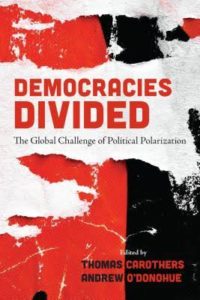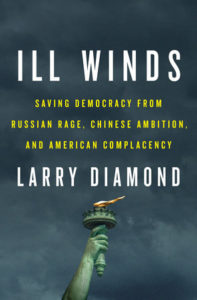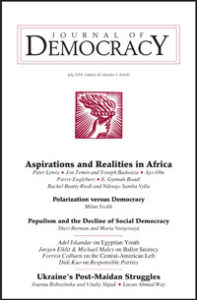 At a time of partisan polarization, are our divisions really so entrenched and unbridgeable? What if we had civil and evidence-based dialogue across our great divides of party, ideology and identity? Stanford University’s James Fishkin and
At a time of partisan polarization, are our divisions really so entrenched and unbridgeable? What if we had civil and evidence-based dialogue across our great divides of party, ideology and identity? Stanford University’s James Fishkin and
The project America in One Room was a national experiment to find out. Over a long weekend in September, a scientific sample of 523 registered voters from around the country gathered in Dallas for an event organized by Helena, a nonpartisan problem-solving institution, People Productions and Stanford University’s Center for Deliberative Democracy, with participants were recruited by the University of Chicago’s NORC, they write for The New York Times:
The experiment produced some shocking results. After several days of diverse small group discussions facilitated by moderators and sessions featuring experts and presidential candidates from both parties who answered questions from participants, the percentage saying the system of American democracy was “working well” doubled to 60 percent from 30 percent.
On the plus side, support for using “diplomacy and financial support to promote democracy and human rights throughout the world” increased from 59 to 72%, with initially skeptical Republicans increasing 19 points, from 43% to 62%, they add.
The supposed trade-off between American values and interests is a myth because it benefits the United States to live in a world where countries maintain the rule of law and democracy. In his last public appearance before his resignation, according to former Ukraine envoy Kurt Volker. Consequently, allies matter and rulers that oppose these values are adversaries, he said in a keynote speech to the Central European Policy Analysis (CEPA) Forum in Washington DC last week,
 In Europe, disagreements should be handled under the Helsinki Final Act of 1975, which lays out rules such as not changing borders by force and not interfering in other countries’ affairs. He also urged European allies to speak out more forcefully against Kremlin myth-making on issues such as NATO enlargement. Those words resonated with an audience of decision-makers from Central and Eastern Europe, CEPA’s Edward Lucas writes.
In Europe, disagreements should be handled under the Helsinki Final Act of 1975, which lays out rules such as not changing borders by force and not interfering in other countries’ affairs. He also urged European allies to speak out more forcefully against Kremlin myth-making on issues such as NATO enlargement. Those words resonated with an audience of decision-makers from Central and Eastern Europe, CEPA’s Edward Lucas writes.
But the alliance of transatlantic democracies is in need of repair, argues Christopher A. Kojm, a Senior Research Fellow at George Washington University’s Elliott School of International Affairs.
Despite current transatlantic troubles, there is significant continuity of shared interests and values, he writes in a paper for the Finnish Institute of International Affairs.
“The structural basis for strong and productive transatlantic relations is intact. While there is no reason to despair, there is also a need to repair,” he observes. “Rebuilding cooperation and trust across the Atlantic will take time. Those relations are profoundly important to the protection and promotion of US interests.”
The foreign policy establishment is not monolithic. Its members dispute issues below the grand strategic level, such as human rights, the extent of multilateral cooperation, democracy promotion, and specific interventions, argues analyst Hal Brands.
Recent polling shows that American support for free trade has risen considerably since 2016. Support for key military alliances and stationing troops overseas has also risen. And while concepts like the “liberal international order” are meaningless to most Americans, a clear majority of respondents to a recent poll by the Center for American Progress believe the jargon-free equivalent: “Our country’s commitment to taking a leading role in shaping security and economic affairs around the world after World War II led to safer and more prosperous lives for Americans.”
*The founding co-editor of the Journal of Democracy, author of “Ill Winds: Saving Democracy From Russian Rage, Chinese Ambition, and American Complacency,” and Senior Consultant at the International Forum for Democratic Studies of the National Endowment for Democracy.

 Better news about the United States’ role in the world comes in the realm of public opinion: Americans
Better news about the United States’ role in the world comes in the realm of public opinion: Americans 





